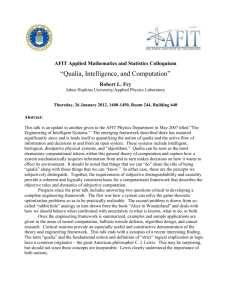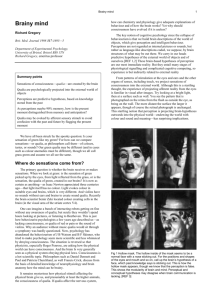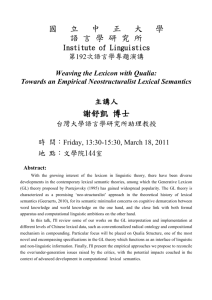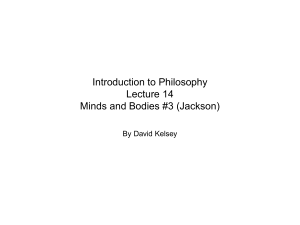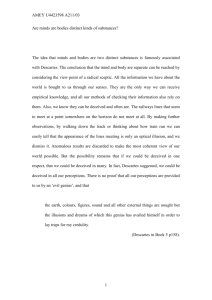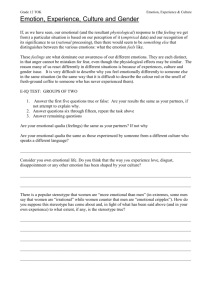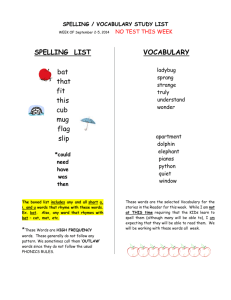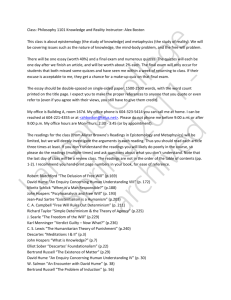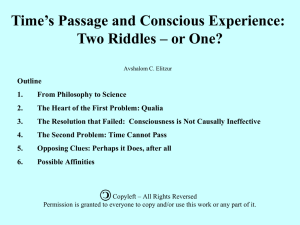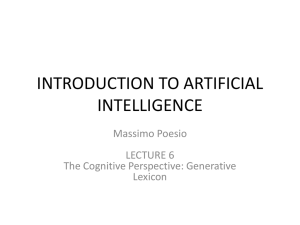Bridging the Qualia Gap: Can a Machine Know What It Is
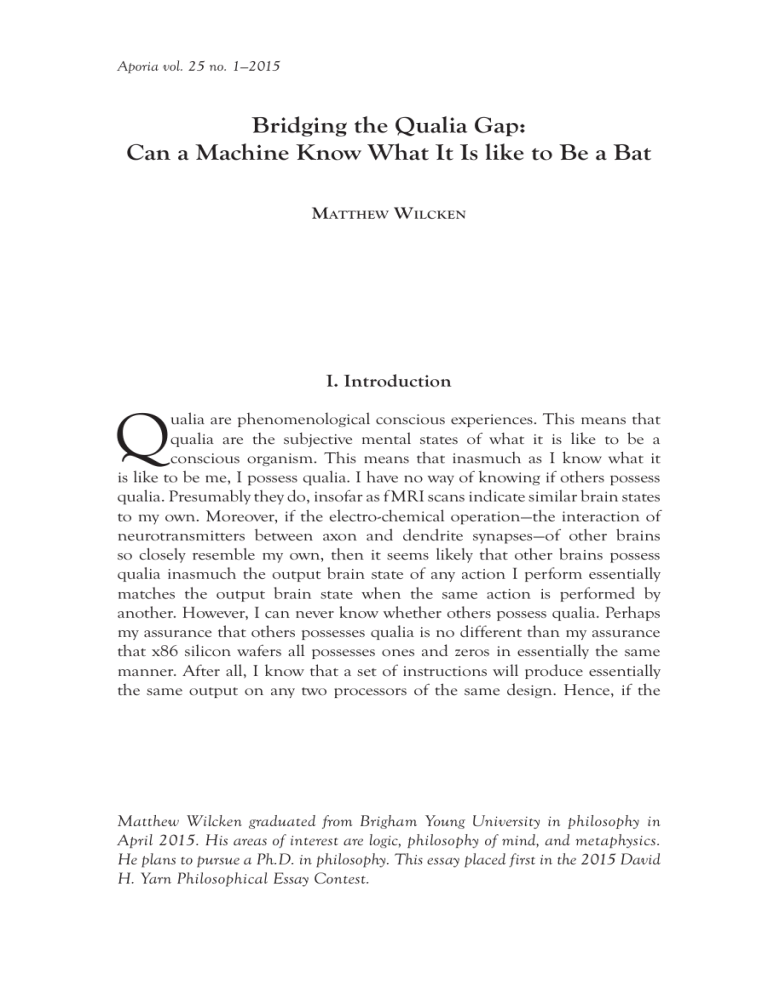
Aporia vol. 25 no. 1—2015
Bridging the Qualia Gap:
Can a Machine Know What It Is like to Be a Bat
M atthew
w ilcken
I. Introduction
Q ualia are phenomenological conscious experiences. This means that qualia are the subjective mental states of what it is like to be a conscious organism. This means that inasmuch as I know what it is like to be me, I possess qualia. I have no way of knowing if others possess qualia. Presumably they do, insofar as f MRI scans indicate similar brain states to my own. Moreover, if the electro - chemical operation — the interaction of neurotransmitters between axon and dendrite synapses — of other brains so closely resemble my own, then it seems likely that other brains possess qualia inasmuch the output brain state of any action I perform essentially matches the output brain state when the same action is performed by another. However, I can never know whether others possess qualia. Perhaps my assurance that others possesses qualia is no different than my assurance that x86 silicon wafers all possesses ones and zeros in essentially the same manner. After all, I know that a set of instructions will produce essentially the same output on any two processors of the same design. Hence, if the
Matthew Wilcken graduated from Brigham Young University in philosophy in
April 2015. His areas of interest are logic, philosophy of mind, and metaphysics.
He plans to pursue a Ph.D. in philosophy. This essay placed first in the 2015 David
H. Yarn Philosophical Essay Contest.
2 M atthew
w ilcken electro - chemical operation of neurotransmitters can be compared to the ones and zeros of a microprocessor, then I may rightfully assume that qualia arises from the combined workings of the human brain.
Despite what seems an obvious fact, the ontological status of qualia is in dispute. Thomas Nagel believes in and argues for qualia, though he admits that one can possess knowledge only of his or her own qualia and never that of another — or of a bat. However, this inability to know another’s qualia or share subjective experiences — a problem known as the “qualia gap”— casts doubt on whether it makes sense to speak of qualia in the first place. To this point, Daniel Dennett argues that since I cannot share my subjective qualia in an objective capacity, qualia do not exist. But Dennett’s assessment is problematic. Notwithstanding my inability to share my qualia directly with another person, it seems I can indirectly share glimpses of it through language. Using language I can tap into my interlocutor’s subjective experiences with qualia such that he or she begins to vicariously “see” my thoughts. Given this limited ability to share subjective states, it is worth considering the possibility of other, more substantial means of communicating qualia in order to close the gap.
Technology may offer a solution. Conceivably, an artificial brain made of synthetic grey matter, or an x86 silicon wafer with as many transistor connections as neural connections in an average human brain, might possess a form of qualia if it demonstrated “brain states” equivalent to a human’s.
This synthetic brain would have to be programmed using an objective, shared language: C++, perhaps. Let us assume this synthetic brain was programmed with software advanced enough to give it artificial intelligence. Might it possess qualia? It is not unreasonable to think that androids with such synthetic brains may one day walk among us, act like us, and interact with us in human - like ways in a convincing display of aliveness. Since we designed and programmed the androids, we would know everything about them and could monitor every bit of data their synthetic brains processed. In other words, if androids possessed qualia, we could view their qualia. But it would be qualia in the weaker sense because it could be objectively observed. More importantly, this weaker form of qualia may, if some sort of neural linking technology is developed, allow us to bridge the qualia gap to know what it is like to be another person, or possibly even a bat.
II. Arguments For and Against Qualia
In “What it is Like to Be a Bat,” Nagel argues against physicalism, the view that only the physical brain can account for conscious experience.
According to Nagel, conscious experience is ultimately interpreted through
B ridging the
Q ualia
g ap
3 language. However, some propositions cannot be expressed in language.
These inexpressible propositions are understood only by the agent and, therefore, imply that there exists an unfalsifiable, unique, and subjective sense of what it is like to be something conscious. In other words, qualia are conscious mental states whose existence implies that there is something it is like to be an organism (219). Nagel suggests that any animal sufficiently up the phylogenetic tree — humans, whales, bats — would possess such subjective experience while lower - order animals would not (220).
This subjective awareness, from the standpoint of a sufficiently advanced organism, enables it to know what it is like to be itself. This awareness is supposed to be evident when I utter statements like, “I know what it’s like to be me because I am aware of my experiences, and I perceive them in the way that I perceive them.” Nagel calls this the “subjective character of experience” (219).
To illustrate this uniquely subjective nature of experience, Nagel turns to bats. Bats, which utilize echolocation to weave around obstacles in the dark, possess subjective experience about what it is like to use echolocation to navigate. While I might imagine use of echolocation to navigate, I can never fully grasp what it is like from a bat’s perspective.
Nagel argues that this is because my mind is restricted to its resources, and those resources are what a human needs to be a human and are limited in the realm of echolocation (220). Additionally, Nagel asserts that human neurophysiology is inadequate because humans lack the neural networks to interpret echolocative sense data (220).
1 Though we can study bats, dissect them, and possibly learn how their brains work, we can never fully understand bat-life from a bat’s perspective (221). Nagel adds that this would be true of Martians who try to understand us. The structure of
Martian minds might likewise make it impossible for them to understand precisely what it is like to be human (221). Ultimately, Nagel hopes to convince us that the human inability to understand what it is like to be a bat suggests that there are propositions which cannot be expressed in human language (221). I propose that these inexpressible propositions are the stronger form of qualia introduced at the beginning of this paper.
Nevertheless, one can still ask how it is possible to justify the existence of qualia, strong or weak, if qualia are fundamentally subjective — to have a justified, true belief in qualia suggests that qualia should be objective
1
There exist certain blind individuals who learn to utilize a form of echolocation within the range of human hearing. These individuals demonstrate marked increases in the visual area of the brain to process echoes (Thaler et al.).
4 M atthew
w ilcken and the same for everyone. Pressing this objection, Daniel Dennett passionately affirms physicalism and denies the existence of qualia.
According to Dennett, the inherently subjective and unshareable character of qualia count against their existence. Thus, in “Quining
Qualia,” Dennett presents a series of thought experiments called “intuition pumps,” which are designed to cast doubt on the existence of qualia.
Intuition pump #3 suggests that if everyone learned color words based on
“public colored objects,” verbal behavior would match even if different colors were interpreted among a set of viewers all ostensibly viewing the color red (230). In other words, my visual spectrum could be inverted, and I would have no reason to think it inverted. For example, if I were pressed to name the color of a red strawberry, I would respond “red.” I do so because
I learned within my community of speakers that the color of strawberries just is red. However, one could imagine that — if my visual cortex were publicly available for scrutiny — when I look at a red strawberry, I actually process and see green instead. In fact, one could conceive that everyone experiences a different color. Nevertheless, neither I nor anyone else would have any reason to doubt that the color I experience is anything but red because the behavior of the community is consistent — everyone points to the same strawberry and calls out “red.” This suggests that what it is like to be a conscious being seeing what one calls “red” has nothing to do with actually seeing red, as everyone’s experience of “red” might be different.
2
Dennett’s next pertinent thought experiment is Intuition pump #7.
In this example, Chase and Sanborn are taste testers at Maxwell House
(231ff ). Their duty is to ensure every cup of Maxwell House coffee tastes the same. After six years of employment, the two admit to each other that their tastes have changed but for different reasons. Chase explains: “My tastes have changed. I’ve become a more sophisticated coffee drinker. I no longer like that taste at all” (232; italics in original). Sanborn, too, reveals his own distaste for the coffee: “I, like you, really don’t care for the coffee we’re making. But my tastes haven’t changed; my . . . tasters have changed” (232; italics and ellipsis original). Thus, the taste of the coffee has not changed for Chase but it has for Sanborn. In short, qualia change over time; they are not static. This suggests that qualia are unreliable and that there is no way to confirm or deny them. Regardless of what it is for me to experience what
I experience at any particular instant of time, Dennett argues “absolutely
2
Perhaps if I, with my inverted spectrum, look at an object which is in fact green and see red, I might report seeing “red” when I am in fact seeing green. In that moment, I would be experiencing red, though in a frivolous capacity.
B ridging the
Q ualia
g ap
5 nothing follows from this presumed knowledge — nothing, for instance, that would shed any light on the different psychological claims that might be true of Chase or Sanborn” (233). Hence, I should not presume anything special about the subjective experience of another insofar as there is some enigmatic thing that it is to have an experience. If someone’s qualia cannot be publicly observable, then there can be no knowledge of qualia’s existence.
3 It is important to note that Dennett does not make the distinction between stronger and weaker qualia, as he rejects qualia altogether. While Chase and Sanborn can share their experiences about the coffee in the weaker sense through language, they appear unable to share their subjective experiences about what it is like to have changed tastes or “tasters” as the case may be. This speaks to Dennett’s objection to qualia since they cannot be objectively shared, but it also ignores the subjective experiences that Chase and Sanborn both have as taste testers.
So Dennett’s example fails to decisively undermine talk of qualia.
III. Could an Android Know What It Is like to Be a Bat?
Keeping Nagel’s argument and Dennett’s objections in mind, let us assume that an artificially intelligent android possesses qualia in some sense because it knows what it is like to be itself. As indicated in the opening section of this paper, an android’s qualia would be qualia in the weaker sense because it was programmed using a shared language, and that shared language could ultimately be decompiled to reveal every aspect of the android’s operation. Let us further assume that we gave this android an echolocatory apparatus so that it could produce high - frequency audio bursts to ascertain its spatial relation to obstacles based on audio reverberation. Might this enable the android to know what it is like to be a bat? It may in the sense that the android would understand echolocation, but it still could not understand hanging upside down, nor would it understand flying about for food, mating, living in a cave, avoiding
3 I am reminded of the example of the “category - mistake.” given by Gilbert Ryle. After being led through libraries, gymnasiums, and various buildings, a foreigner being shown
Oxford University asks: “But where is the University?” (34). The answer, of course, is: “All around you.” So, where is the mind? I do not assert that Dennett is guilty of committing the
“category - mistake,” but if qualia is to hold as a property of mental function, then qualia must exist in the totality of the mind. Surely there is no little being in the brain who identifies itself as the all - mighty qualia. It must be every brain cell shouting in accord: “Here am I!” Hillary
Putnam might agree, as he suggests that it is the arrangement of the parts which accounts for consciousness (45–54). Hence, qualia must hinge upon the entirety of the mental process.
6 M atthew
w ilcken predators, and many other aspects of bat life. It may be able to imagine such things, but, as Nagel tells us, certain propositions would elude the language it uses for understanding (221). Perhaps a specially designed android bat might come to know what it is like to be itself — an analogue of a bat — but would it come to know what it is like to be a bat? It might certainly think of itself as a bat, but I doubt it would ever possess the stronger form of qualia a genuine bat would possess. Perhaps it might share the same predicament as Lieutenant Commander Data from Star
Trek: The Next Generation. Like Data, an android on a seemingly endless quest to understand what it is like to be human, the android bat could be programmed to desire to understand what it is like to be a bat. Perhaps if the android bat were unaware that it was an android and was placed among bats, it might not know any better than to mimic the bats it is surrounded by and would eventually learn to understand what it is like to be a bat. And since it is an android, let us assume that it could be linked up to a computer. We could then study all of its sense data (its weaker qualia) and possibly arrive at some weaker - qualia sense of what it is like to be a bat.
IV. Could a Neural Link Allow a Human to Know
What It Is like to Be a Bat?
Allowing for the possibility that stronger and weaker qualia exist, and allowing for an android to possess weaker qualia such that it can arrive at some sense of what it is like to be itself, let us now move on to the possibility that an android brain might help in bridging the qualia gap. This scenario is not so farfetched, as our scientific understanding of human neurological function is always increasing. For example, medical technology has advanced to the point where brain function can be restored after neural injury has taken place (Guggenmos et al.).
Furthermore, recent electronic prosthesis can receive data directly from the human brain, allowing amputees to grapple items (“Publications”).
Direct brain - to - brain interface allows rudimentary outgoing communication of basic neural signals via electroencephalography (EEG) and receipt of incoming neural signals via transcranial magnetic stimulation (TMS) to two persons cooperating in controlling a simple video game (Rao et al.). With these and many other exciting developments at the forefront of neuroscience, it is not too giant a leap to consider the possibility that full control of electronic devices using only the mind is only a few years away. This full control would include web browsing, vehicle operation, and many other possibilities. Even more
B ridging the
Q ualia
g ap
7 impressive would be the ability to store and retrieve memories using electronic storage media. There may one day be an online database of memories to peruse.
Assuming memories could be stored electronically, could a program be written to generate some kind of observable manifestation of those memories? Perhaps I could one day connect myself to the memory databank and relive my wedding night. Say the memories were indexed emotionally as “happy,” “sad,” “passionate,” and so forth. Might the same artificially intelligent program used for our synthetic brain be able to understand such concepts? If it could, then surely it would possess the weaker form of qualia I have been proposing. This is because in knowing what it is like to be something, such subjective experiences as happiness and sadness seem to require knowledge of what it is like to feel those feelings. This knowledge requires the ability to draw from language and memories associated with sensation.
With the possibility that our synthetic brain could understand memories and know what it is like to be itself, how might this synthetic brain allow me to bridge the qualia gap and know what it is like to be another person or possibly even a bat? For the purposes of this argument, let us assume that the ones and zeros of the synthetic brain could be rendered compatible with an organic brain through some form of real - time emulation via a neural link. So accomplished, I can directly communicate or even control the synthetic brain with my thoughts. This opens up a curious possibilit y: with the android brain acting as medium, it may be possible to see another’s thoughts. If this were possible, I would be able to hear, see, taste, smell, feel tactile sensation, and possibly view memories from another’s perspective. If a neural link were established between two human minds could I then know what it is like to be another person? To avoid excessive pretension, I will assume that I could not know what it is like to be that other person in the stronger sense but only in the weaker sense. Here I partially agree with Dennett: no matter how penetrating the medium, I believe there may never be a way to fully share my stronger qualia of what it means to be me with anyone else. Stronger qualia are immune, so to speak, from objective observation. Let us also consider that the medium we are using to connect our minds together is ultimately based on language: the language in my mind conceptually organizing my thoughts, the compiled C++ ones and zeros running the synthetic brain, and my companion’s inner language organizing his or her thoughts. Lastly, let us say that the link is passive, meaning that it requires no conscious effort on either person’s part to use it. Rather, I connect to the link and, without effort, see what my partner sees.
8 M atthew
w ilcken
My partner and I begin the mental link and are immediately aware of one another’s perspectives. There are subtle differences in audio and visual acuity. I am totally aware of what it is like to be my partner in a weaker sense, a view my partner shares about me. We can see each other’s thoughts and spend time joking about old memories. During the entire experiment, the only thing I cannot access is what it is truly like to be my partner — I cannot access my partner’s stronger qualia. After several minutes, the experiment ends. Though we have gained a greater appreciation (or resentment) for one another, we were unable to tap into what it truly meant to be the other person. We conclude that all we really did was exchange a highly sophisticated and detailed form of weaker qualia. Nothing we experienced was any more visceral than a highly advanced movie complete with scent, touch, and taste effects.
Now that we have explored what it might be like to share qualia, let us now turn to Nagel’s claim that we cannot know what it is like to be a bat. Assume that we have devoted just as much effort to understanding bat neurophysiology as human neurophysiology, and in so doing, we have reached a striking discovery: bat brains (and indeed most all mammalian brains) operate more or less like human brains (at least at the neurotransmitter level). We have successfully decoded the bat brain and are now ready to embark on the world’s first human - bat neural link.
Upon link up I am immediately aware of being restrained. I both see myself sitting some distance from the new vantage point that has just entered my mind as well as looking down at the restrained bat. I am aware that two minds are present, but one is vastly more developed and cognizant of its surroundings (not to sound too partial to the human perspective). The new field of vision seems less developed; the lights in the room are too bright, though my eyes have done their best to adjust. Suddenly, I notice that the room I am in is, for some reason, better ascertained through audio and not visual sensation. I can hear everything — the restraint, the walls, the ceiling - mounted fluorescent tubes, the person giving me bits of fruit every ten seconds, and so on.
Audio is my new preferred method for locating myself in space. I can see where things are via sound. My human side tells me that I have never known such accuracy gleaned through hearing. A 3-D holographic projection of the room based solely on audio reverberation forms in my mind. I possess no language to describe this new train of thought, so it is difficult to cling to, yet it remains in my mind. Slowly, I develop a language to understand it; I begin to understand what it is like to be a bat.
My mind does its best to return to my human perspective though
I cannot divorce the bat’s perspective from my awareness. I see the bat restrained on the table some six feet from me. A simpler portion of my
B ridging the
Q ualia
g ap
9 awareness is terrified of the towering creature beside me placing things that
I like to eat in front of me. In this moment, a curious realization occurs: I realize that the bat is aware that something new has just entered its mind but it pays it little to no heed. I know this because the neural link makes everything known to me. I surmise that the bat either may not possess the sophistication to understand what is going on, or it lacks language adequate to describe its circumstances.
After five minutes, this groundbreaking experiment ends and the link is terminated. I realize that I understand what goes on from the bat’s perspective but that I never managed to grasp the deeper, strong sense of what it meant to be a bat. There was something elusive that I could not fully understand. I could see everything it saw, hear everything it heard, taste everything it tasted, and so forth. I was aware only of its weaker qualia.
V. Conclusion
Though much of this paper has been highly speculative, I believe what has been presented here is a plausible instance of what it might be like to share qualia. I cannot say why the stronger form of qualia would be elusive, only that what I see and hear from another’s perspective
(and this would include echolocation, tactile sensation, and so forth) would be no more real to me than an incredibly sophisticated movie.
The stronger form of qualia is qualia proper, the sort of qualia Nagel argues for and Dennett vehemently opposes. The weaker form of qualia is any sharable form of what it is like to be something conscious. An alien species possessing telepathy might wonder what it is like to be the one with which it communicates thoughts. After all, they might never be able to dig so deeply into another’s consciousness to truly experience that other’s reality. Our neural link, mediated via an artificially intelligent synthetic brain, would be no more real, I should think, then a telepathic link. In conclusion, weaker qualia is shareable, stronger qualia is elusive.
Works Cited
Chalmers, David J. Philosophy of Mind: Classical and Contemporary
Readings. New York: Oxford, 2002.
Dennett, Daniel C. “Quining Qualia.” Chalmers 226–46.
Guggenmos, David J., et al. “Restoration of Function After Brain Damage
Using a Neural Prosthesis.” Proceedings of the National Academy of
Sciences of the United States of America 110.52 (2013): 21177–82.
Nagel, Thomas. “What is it Like to Be a Bat?” Chalmers 219–26.
“Publications.” Motorlab. U of Pittsburgh, 2006–2014. Web. 20 July 2015.
Putnam, Hillary. “The Nature of Mental States.” Chalmers 73–79.
Rao, Rajesh P. N., et al. “A Direct Brain - to - Brain Interface in Humans.”
Ed. Jeffrey Krichmar. PLoS ONE 9.11 (2014): e111332. PMC.
Ryle, Gilbert. “Descartes’ Myth.” Chalmers 32–38.
Thaler, Lore, Stephen R. Arnott, and Melvyn A. Goodale. “Neural
Correlates of Natural Human Echolocation in Early and Late Blind
Echolocation Experts.” Ed. David C. Burr. PLoS ONE 6.5 (2011): e20162. PMC.
